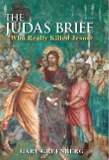In the arsenal of anti-Jewish Christian bigotry, 1 Thessalonians 2:13-16 holds a prominent place. Here is the NRSV translation, with a key portion underlined.
We also constantly give thanks to God for this, that when you received the word of God that you heard from us, you accepted it not as a human word but as what it really is, God's word, which is also at work in you believers. For you, brothers and sisters, became imitators of the churches of God in Christ Jesus that are in Judea, for you suffered the same things from your own compatriots as they did from the Jews, who killed both the Lord Jesus and the prophets, and drove us out; they displease God and oppose everyone by hindering us from speaking to the Gentiles so that they may be saved. (1 Thes 2:13-16. Emphasis added.)
Note particularly the comma following "Jews". As it now reads it would appear that Paul accuses all Jews of killing Jesus. Many NT scholars have suggested that this passage was not originally part of Paul's letter, that it was added at a later time. But Raymond Brown, in his Introduction to the New Testament says that the majority view holds that the text is original with Paul.
In The Judas Brief I suggest that this passage should be considered in the context of Petrine allegations in Acts 2:23 and 3:17. In the first verse Peter allegedly accused the Jews of killing Jesus only in the sense that they handed him over to Pilate, but Peter gives no motive or explanation for this action. In the second passage Peter says that the Jews acted out of ignorance, which should be understood as meaning that whatever responsibility the Jews had stemmed from a failure to understand that Jesus was the Messiah and not from any hostile motives. If Paul's accusation can legitimately be placed in this context, his charge against the Jews should be understood in a much less hostile manner than that exhibited by later Christians. Unfortunately, we can't really be sure what intention Paul had as he was often engaged in polemical attacks on Jews, both non-Christian and Christian.
Recently, I received a note from a prominent academic well-versed in ancient Greek who was kind enough to read The Judas Brief and give me his thoughts. In the course of his remarks he noted that the English translation of 1 Thes 2:14-15 wrongly inserts a comma after the word "Jews". The underlying Greek, he tells me, indicates a restrictive clause. This means we should eliminate the comma and the passage should then be understood as applying not to all Jews, but only to those Jews who engaged in the specific action alleged. If this is correct, then Paul only attacks some Jews, not all Jews. Although in The Judas Brief I reject the idea that any Jewish leaders had any responsibility for the death of Jesus, I do welcome this observation that undermines a major anti-Semitic argument.



3 comments:
Your argument does not take the overall context of the New Testament into account. Jesus and all the apostles, not to mention John the Baptist, and Paul himself, were all Jews. In the New Testament, however, when a phrase like this is stated "...even as they have of the Jews: who both killed the Lord Jesus, and their own prophets, and have persecuted us; and they please not God, and are contrary to all men:" it refers to the Jewish HIERARCHY. Who killed the prophets? Not common Jews, but the hierarchy. Who killed Jesus? Again, not common Jews, but the hierarchy. Who persecuted Christians? Again, the hierarchy. Read the book of John and note the contrast between the common people of the Jews and the hierarchy (many times specifically referred to as the chief priests and Pharisees but also many times just called "the Jews") who themselves condemned the common people saying "this people who knoweth not the law are cursed." (John 7:49) Not also Mark 12:37 "And the common people heard him gladly" and Luke 7:29-30 "And all the people that heard him, and the publicans, justified God, being baptized with the baptism of John. But the Pharisees and lawyers rejected the counsel of God against themselves, being not baptized of him." The idea that the New Testament is anti-semitic is a myth perpetrated by illiterate men who can't read any critical language that doesn't contain mile-long qualifiers without getting their panties in a knot.
As I noted in the article, it is anti-Semites who cite the passage as support for their position. This doesn't mean they are right. The note from the scholar that I cited is in line with your interpretation that the charge is against only those who took the action in question. The problem, however, is that many translaters put the comma into this passage, changing the meaning from restrictive to inconclusive. On the other hand, assuming for the sake of argument that the Gospels don't have an inclusive usage when they attack "Jews" or "Pharisees", we can't be sure that Paul writing at an earlier time had the same understanding that the later writers had.
I think it's amazing that you spend your life wondering about a so-called mangod. It's like a page out of greek mythology. When the messiah comes he will achieve his tasks, not fail miserably at them and be killed like a common criminal.Come on! Moreover, The messiah is not supposed to be Gd he is sent by Gd to bring truth of the ONE true Gd, the Gd of the Israelites, restore Jerusalem and the Holy Temple to its original splendor, gather the Jews back from exile etc. Jesus didn't do nuttin'....The proof is in the pudding. Let it go already. Once again, if you didn't get it....messiah and Gd...one we pray to, one we pray FOR.
Post a Comment